Latest articles
30.09.2020
ECML Webinar "How to ensure that languages flourish in your school" (12 October 2020): register until 9 October!

Would you describe your school as language-sensitive? Were teachers able to address the different linguistic needs of learners during lockdown? How well is your school adapting to hybrid ways of working? Are you looking for inspiring ideas for launching whole-school language projects?
If you are a headteacher, inspector or in a role that supports teacher development in relation to language education, this webinar is for you. By showing you a range of easy-to-use resources developed through the ECML project EOL – learning environments where foreign languages flourish – and adapted to hybrid learning, it will help you see how much your school can benefit from taking a holistic approach to language education which supports all learners reach their potential. It also offers an excellent opportunity to promote collective reflection around the challenges that schools are facing as the pandemic continues.
The webinar will take place at the following times:
- in English: Monday, 12 October: 14:00-15:30 CET
- in French: Monday, 12 October: 16:00-17:30 CET
If you wish to participate, please register here by 9 October indicating which session (English or French) you would like to attend. Registered participants will receive an e-mail notification by 9 October including the link to join the webinar on 12 October.
For any questions regarding registration please contact: catherine.seewald@ecml.at indicating in the subject line of your message “How to ensure that languages flourish in your school” webinar.
05.06.2020
Promoting quality language education through learning environments where modern languages flourish

The European Centre for Modern Languages (ECML) of the Council of Europe is pleased to announce the launch of a new resource website of particular relevance to language teachers, subject teachers, teacher educators and headteachers at a time when schools are cautiously reopening across Europe.
“EOL – Learning environments where modern languages flourish”
This website which is available in English, French and German, provides a wide range of tools to create whole-school learning environments where languages are at the very heart of learning and teaching. This holistic approach supports and enhances cooperation and professional development of all actors involved and embraces all fields of education – learning, teaching, schools and education systems.
The EOL tools and resources can help develop and strengthen quality language education which celebrates linguistic and cultural diversity and is so essential today to ensure intercultural dialogue and social cohesion in our societies:
This open-access resource website has been developed within the framework of the ECML programme “Languages at the heart of learning” (2016-2019), through expert cooperation in the field of language education across geographic Europe and beyond. All the tools have been tested by partner schools involved in the EOL project between 2016 and 2019.

For more information:

12.06.2019
"Learning environments where modern languages flourish": forthcoming online EOL training course and tools
On 25th and 26th April 2019 the last expert meeting of the EOL project "Learning environments where modern languages flourish" took place with Kristin Brogan (Ireland), Jonas Erin, coordinator (France), Lea Stiberc (Slovenia) Silvia Minardi (Italy). The EOL project is an action research project of the ECML which is part of the four-year programme 2016-2019 entitled "Languages at the heart of learning". The project aims to respond to the needs expressed by the 33 member States, particularly with regard to the attractiveness and efficiency of language learning. By drawing on all the stakeholders in education – pupils, parents, teachers, management staff, inspectors, researchers – the expert team built on the collective intelligence of the EOL network which has led to a series of outputs, including an online training course and 52 tools to support language policies. More than one hundred schools from 16 European countries contributed to this reflection process. The work of the experts at this last meeting consisted mainly of defining how these tools can best be used in different contexts. The training course and tools will be accessible on the EOL site in autumn 2019.
01.06.2019
Forthcoming: strategies, tools and resources for all those who want to change their school into a place where languages can flourish
The “expert team” of the EOL ECML project "Learning environments where modern languages flourish"
(www.ecml.at/learningenvironments) met for the last time at the ECML on the 25th and 26th of April 2019. The team members are Jonas Erin from France (the coordinator), Lea Štiberc from Slovenia, Silvia Minardi from Italy and Kristin Brogan from Ireland. This was an important opportunity to tidy up any work that still needed to be done for the project. On the other hand it was also very sad for all the team members to have their last meeting as cooperating together on this project changed the relationship from colleagues to friends and we always appreciated how well we operated as a team. Hard to believe that three and a half year have passed of our 4 year-long project.
The team had a productive two days meeting and worked on the following items:
- revising the 52 tools; including the Matrix;
- revisiting the 17 memos and the TrEOL game;
- restructuring the content of the project website;
- discussion and feedback on our network of partner schools and its future; the glossary, the final publication; the current status of the research as part of our project and looking at the resources from our schools: action plans and case studies;
- dividing all future tasks among the team members.
During the meeting we also created 17 videos by team members on the themes of our tools and also on the EOL process. The themes are: EOL’S HOLISTIC PHILOSOPHY, LEARNING & TEACHING, MANAGEMENT AND PROFESSIONAL DEVELOPMENT. These videos are explaining and summarizing the content of the tools and will be available on our EOL website.
The project team also looked at the feedback by the participants from the EOL workshop on the 7th and 8th of March with 28 participants from 28 countries. 75% of the participants were fully satisfied with the event, 63% of the participants strongly agree that the materials and approaches discussed at the event will help them to promote plurilingual, intercultural and inclusive learning, 56% of the participants think that the event is relevant for their country as it addresses current needs in language education. The participants pointed out, that it was very useful and interesting to communicate with colleagues from other European and non-European countries, to collaborate and to share experience about schools and educational systems and that the workshop was an excellent and inspiring event/training.
The team is considering the ECML’s Training and Consultancy programme as workshops to participants would be a very exciting opportunity for future cooperation and would be of great benefit to the EOL project’s dissemination.
The team would also like to thank all ECML staff members for their ongoing vital support for this project during the last three and a half year. It has always been a pleasure to come to the ECML for a meeting and we were always welcomed by smiles and perfect organization. Hopefully our EOL project will have met the key challenge to give a vision of a language friendly environment, encourage a strategic approach to language teaching and learning and to provide tools and resources to all those who want to change their school into a place where languages can flourish.
The project team:
Jonas Erin (coordinator), Kristin Brogan, Silvia Minardi, Lea Štiberc
29.05.2019
“Learning environments where modern languages flourish”: project presentation in Norway
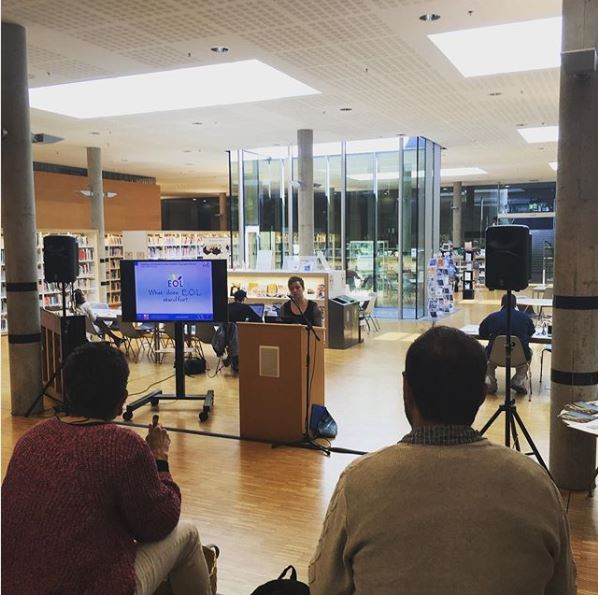 The ECML project “Learning environments where modern languages flourish“ (2016-2019) seeks through and for languages to strengthen the development both of social competences and competences for democratic citizenship.
The ECML project “Learning environments where modern languages flourish“ (2016-2019) seeks through and for languages to strengthen the development both of social competences and competences for democratic citizenship.
On 29 May, Solena Pradayrol, French adviser at Fremmedspråksenteret.no and National Contact Point for the ECML in Norway, presented this project at the faculty Høgskole i Østfold in Halden. The public event offered an opportunity for some 20 teachers, researchers and students to familiarise themselves with the EOL approach. The initiative took place within the framework of the #språkfika project which aims to promote languages through presentations of university language teachers once a week during the lunch break.
The EOL matrix, one of the key outputs, gives an overview over different fields and areas which might support schools developing learning environments where modern languages flourish. By matching 4 “environmental levels” with 5 dimensions of language learning, the matrix should help schools identifying new opportunities for and through languages. The goal is modelling your school towards a language friendly learning environment.
The Matrix is currently available in English, French, German, Greek, Norwegian and Spanish. It will be connected to a glossary and different tools and resources. All EOL project outputs will be available online in the course of 2019.
Related links
16.04.2019
Tools and resources for changing schools into places where languages flourish: available online in the course of 2019
The ECML EOL project (www.ecml.at/learningenvironments) held a workshop on the 7th and 8th of March with 28 participants from 28 countries plus the project team. Jonas Erin from France is the coordinator and the team members are Lea Štiberc from Slovenia, Silvia Minardi from Italy and Kristin Brogan from Ireland. The workshop was joined by three special guests: Marisa Cavalli from Italy as the ECML consultant; Génaël Valet from the French Ministry of Education, an expert for the online training platform M@gistere, and Leslie Neumann from TU-Darmstadt University who presented her current research.
The main goal of the workshop was to share the outcomes of the project with participants from member states and to receive feedback on the EOL tools that had been developed by the team and with the vital support of the ECML team.
Among the tools the team has been developing, there is an online course which can be used to start creating learning environments where languages flourish. The schedule of the workshop was strictly based on the different steps of the online course, i.e
- Step 1: What are learning environments?
- Step 2: How to design priorities
- Step 3: How to define new strategies
- Step 4: What research underpins EOL?
- Step 5: How to set up a whole school plan
- Step 6: Assessing and training
- Step 7: Implementing EOL
Participants gave useful feedback on the various project tools – the Matrix, the TrEOL game, the memos, the case studies, the glossary and the action plans. This adds a quality check to these outputs which have also been piloted.
The project team will meet for the last time in April at the ECML in Graz and will discuss the final plans for this ambitious ECML project; for example, final adaptations of the outputs based on the feedback received. All project tools for teachers and the wider language community will be available on the website.
The overarching aim of this four year project has been to develop a vision of a language friendly environment, encourage a strategic approach to language teaching and learning and to provide tools and resources to all those who want to change their school into a place where languages can flourish.
The project team:
Jonas Erin (coordinator), Kristin Brogan, Silvia Minardi, Lea Štiberc
28.03.2019
“Learning environments where modern languages flourish” (EOL): dissemination workshop (Graz, Austria, 7-8 March 2019)
The dissemination workshop of the EOL project took place at the European Centre for Modern Languages (ECML) in Graz on 7-8 March 2019. It brought together participants from 28 out of the 33 Council of Europe member states signatories of the Partial Agreement on development of language education.
The EOL project is an action research project of the ECML which is part of the four year programme entitled “Languages at the heart of learning”. The project, strongly supported by the Ministry of National Education, Higher Education and Research of France aims to meet the needs of the member states, concerning in particular the attractiveness and efficiency of language learning.
More than a hundred schools from 16 European countries are part of the network on which the work carried out during 4 years (2016-2019) was based. The collective intelligence of the network and the numerous stakeholders mobilised around schools – researchers, inspectors, trainers, professors – provided the following deliverables:
- an online training course for teachers and headmasters;
- a website containing more than fifty tools, resources from schools, science popularisation sheets, etc;
- a research text for publication by the ECML.
The workshop was based on a participative approach that involved participants, representatives of their countries, in witnessing and valuing the specificities of their countries’ learning environments. An enriched presentation was organised in order to mobilise the participants:
- Upstream, in the presentation of their educational context, expectations and reading of the issues related to learning environments;
- Downstream, in the experimentation of the EOL project on the French platform M@gistere and the valorization of their contributions on the European project site.
The workshop was conducted around four aspects of dissemination of the project:
- Access the general philosophy of the project
- Definition of learning environments
- Presentation of the EOL matrix by measuring the extent of the issues
- Understanding the change management processes
- Symbiotic approach to language issues at the school level
- Research results
- Development of an implementation strategy adapted to the context of each individual
- Development of a linguistic plan for a school
- Collaborative writing of an action plan
- Dissemination of the project through stakeholder training
- Project management and the contributions of hybridisation
- Valorisation of skills, stakeholders and schools
The dissemination workshop had three objectives:
- Share through the results of the EOL project the values promoted by the Council of Europe – Human Rights, the Rule of Law and Democracy – and the richness of the ECML projects
- Allow participants to access the EOL project and equip them for the dissemination of the project
- Expand the European EOL network
The survey carried out by the ECML at the end of the workshop shows that the EOL project received a very favourable reception, not only in its context but also in its operationalisation and the development of a European intelligence of language-related learning environments.
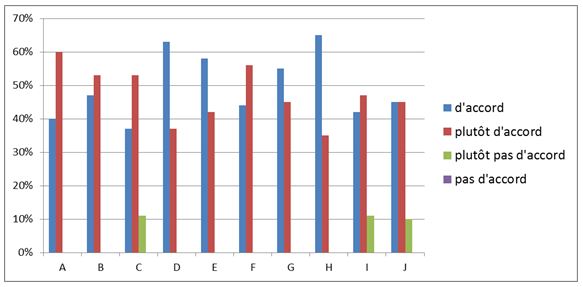
A. The topic of this workshop was relevant to the context of my work.
B. The presented approaches and materials are useful for my work.
C. I am convinced that learners in my country can benefit from the implementation of the presented approaches and materials.
D. The materials and approaches discussed at this workshop help me to promote plurilingual, intercultural and inclusive learning.
E. This workshop has given me ideas on how access to quality education for all learners can be improved.
F. I think this workshop is relevant for my country as it addresses current needs in language education.
G. This workshop has developed my professional competence further.
H. This workshop has motivated me to become more active in networking with the professional community.
I. This workshop encouraged me to play a more influential role in reform processes in my professional environment.
J. This workshop highlighted quality aspects of language education that I will promote in my professional environment.
By the end of 2019, the EOL project website www.ecml.at/learningenvironments will be available in three languages: French, English and German.
The project team:
Jonas Erin (coordinator), Kristin Brogan, Silvia Minardi, Lea Štiberc
08.03.2019
“Learning environments where modern languages flourish”: tools and resources tested by 28 participants from 28 countries
28 participants from 28 member countries discovered and tested tools and resources developed by the ECML project “Learning environments where modern languages flourish ” (EOL). The key challenge of the project is to support schools that wish to establish language friendly learning environments which promote the exchange of related resources, research and practice. Participants had the opportunity to familiarise themselves with the holistic approach to language education that is at the heart of the EOL project.
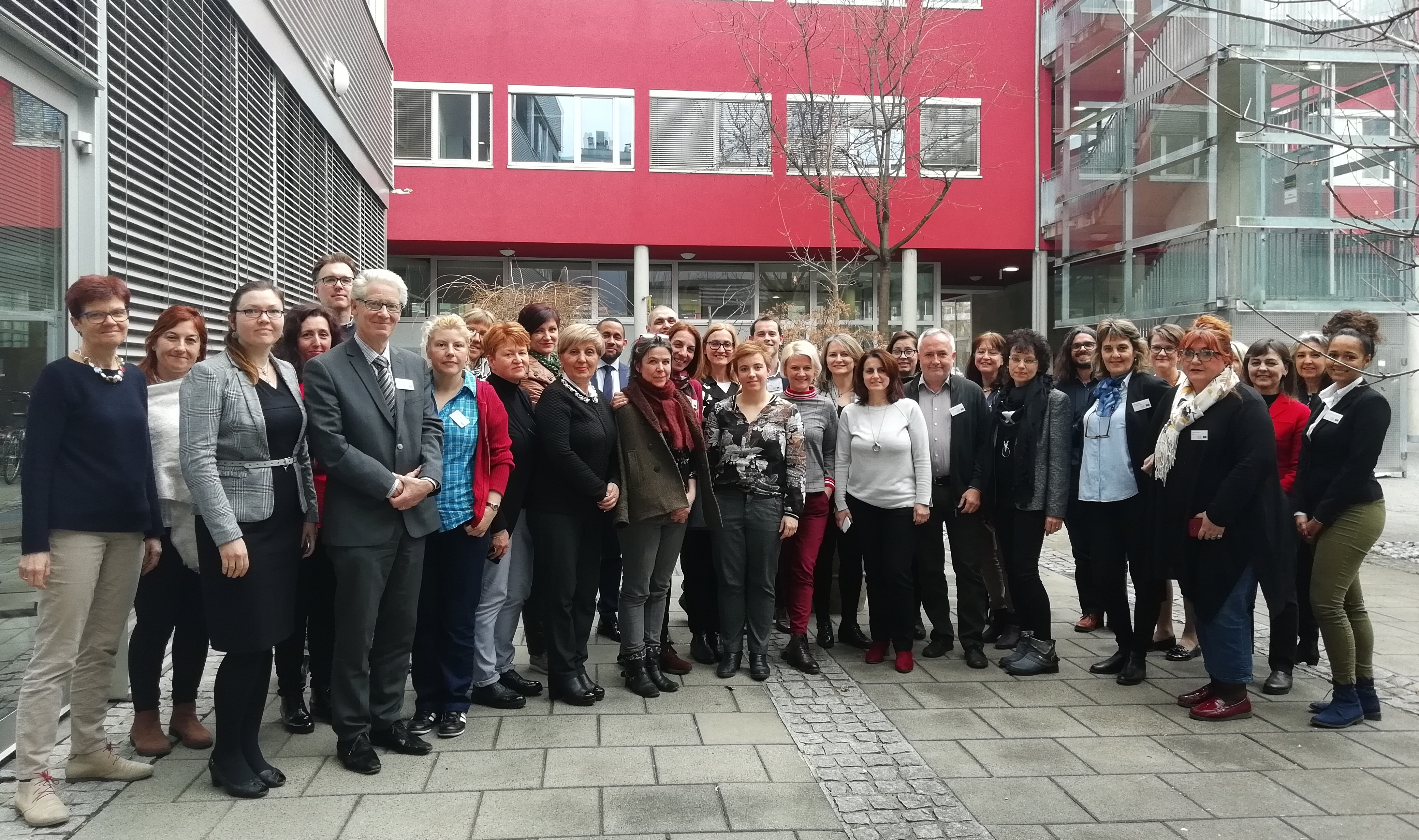
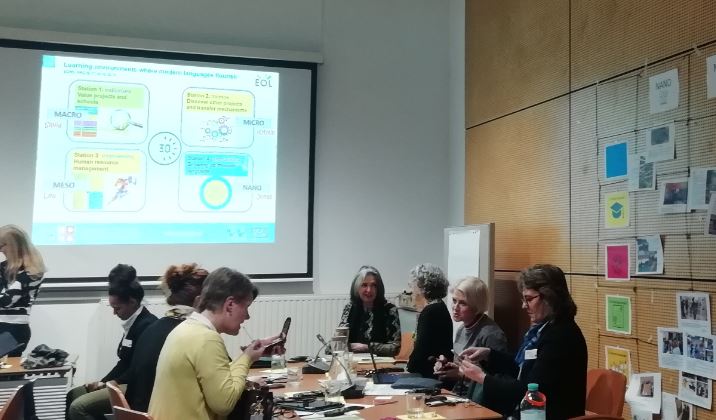
30.01.2019
2018 – an important year for EOL
2018 proved an important year for the EOL project ECML project "Learning environments where modern languages flourish" as thanks to the numerous dissemination actions carried out by the team, the innovative approach of the project started to be known among partner schools and beyond. Schools can now see and experience how they can benefit most out from a holistic approach to developing learning.
The network meeting held at the ECML this year helped to reinforce the key role that partner schools play within the project. All the project tools have been consolidated thanks to the network meeting participants. An impact survey helped refine the project’s quality assurance. The EOL project website, https://eol.ecml.at, offers a diverse toolbox: a matrix and matrix questions, an innovative method of collaborative work, memos that list many other ECML projects, a glossary, indicators, etc.
The EOL project has been presented in several countries:
- in Agrinio (Greece), EOL was at the heart of a training conference for teachers, school principals and inspectors;
- in Bad Hofgastein (Austria), it facilitated the collaboration between teachers of vocational education during the CEBS (Center für berufsbezogene Sprachen) seminar;
- in Copenhagen (Denmark), it supported the training reflection of Danish French teachers;
- in Saarbrücken (Germany), EOL helped to accompany the Franco-German high school team on intercultural pathways;
- in Poitiers (France), EOL was used for training inspectors.
The EOL project is now in its final phase of development. The team is currently focused on developing a written publication and on the establishment of an online training platform. The work on the project is also organised around the transfer of innovation. This project is being implemented in other places, for example, in Martinique in the French West Indies. The matrix has been adapted for use on other issues such as competences for democratic culture (Council of Europe) or the levers of educational innovation.
Finally, a qualitative label project is being discussed with the ECML.
The team looks forward to disseminating the results of the project during the workshop scheduled for 7-8 March 2019.
For participation in the workshop please click here.
The project team:
Jonas Erin (coordinator), Kristin Brogan, Silvia Minardi, Lea Štiberc
- Website of the project "Learning environments where modern languages flourish" (available in English, French and German): http://eol.ecml.at/
13.06.2018
Just published : Courriel européen des langues – Issue no. 40, the e-magazine of the National Contact point for the ECML in France
The “Courriel européen des langues”, the online magazine which is edited twice a year by the International Centre for Pedagogical Studies (CIEP), has been relaunched with renewed contents and a refreshing layout. The current issue highlights 6 ongoing ECML projects, giving the floor to the project coordinators and a project team member, as well as to teachers in the field. In addition, the National Contact Point for the ECML highlights the new national language strategy in Denmark. Finally, a section presents 11 recent resources (online materials, publications).
The Courriel is disseminated in French on the CIEP website and on its LISEO portal (see dedicated section “Courriel européen des langues”). You can subscribe for free to the Magazine and find the archives here: http://www.ciep.fr/lettres-information/courriel-europeen-langues.
Contents of Issue no. 40 – May 2018 (only available in French):
Focus sur le projet EOL
- EOL – Des environnements d’apprentissage optimisés pour et par les langues
Article de Jonas ERIN, Inspecteur général de l’éducation nationale, coordinateur européen du projet EOL
- Témoignages
- Le projet EOL au collège André Chénier (Carcassonne)
Témoignage d’Émilie Courtejaire, avec la collaboration de Selvi Gras, professeur d’anglais et professeur d’espagnol au collège André Chénier, coordinatrice du projet EOL pour le collège
- Le projet EOL au lycée Les 7 Mares (Maurepas)
Témoignage de Noëlle Sédilot-Gasmi, Professeure d’espagnole et coordinatrice de la discipline, initiatrice et coordinatrice du projet EOL pour le lycée
Autres projets du CELV
- Le projet e-lang - Vers une littératie numérique pour l’enseignement et l’apprentissage des langues
Article de Christian Ollivier, Professeur des universités à l’université de La Réunion, coordinateur du projet e-lang
- La/les langue(s) de scolarisation : une feuille de route pour les établissements scolaires
Article de Rebecca DAHM, Maître de conférences en didactique des langues, ESPE Midi-Pyrénées – Université Toulouse-Jean Jaurès, coordinatrice du projet Langue(s) de scolarisation
- Le projet QualiMatrix dans sa dernière année de développement
Article de Gudrun ERICKSON, University of Gothenburg, Department of Education and Special Education, documentaliste du projet QualiMatrix
Actualités
- Développer la conscience linguistique dans les matières scolaires : appel à contribution pour les enseignants de DNL
- Vers un Cadre européen commun de référence pour les enseignants de langues : trois instruments à l’honneur en 2018
- La Gazette européenne des langues
L’enseignement des langues au Danemark
- Entretien avec Ana Kanareva-Dimitrovska, point de contact national du Danemark
Propos recueillis par Marion Latour et Bernadette Plumelle
Ressources
- À explorer sur internet
- Label européen des langues : EUROBAC
- Écrire en plusieurs langues : dossier réactualisé « Intégrer le numérique en classes de langues »
- Dossier thématique « La mémorisation : Dans quelle mesure le numérique permet-il de créer des situations d’apprentissage efficace ? »
- Audio Lingua : 5 000 fichiers audio en 13 langues
- Radio Garden : écouter en direct toutes les radios nationales, locales ou web du monde
- 7 nouveaux kits eTwinning pour monter un projet eTwinning
- Vient de paraître
24.05.2018
EOL keynote and workshop "Strengthening synergies between practice, research and policy" (Agrinio, Greece, 11 May 2018)
The Greek Ministry for Education and Religious Affairs requested the expertise of the European Centre for Modern Languages (ECML) to support the implementation of important changes in policy and practice in language education, as it moves towards a more holistic approach which responds to constantly evolving needs of both learners and teachers. The current political and social context of migration together with the impact of electronic communication have resulted in increased linguistic and cultural diversity in Greek classrooms.
Organised by the Regional Directorate for Primary and Secondary Education in Western Greece and held in the music school of Agrinio, the conference included three other short presentations and a workshop which brought together 37 professionals: 25 teachers, 5 headmasters, 5 school advisors, Mr BARIS (Head of Scientific and Pedagogical Guidance for Primary Education at the Regional Directorate of Education in Western Greece) and Mr GIANNOPOULOS (Regional Director for Primary and Secondary Education in Western Greece).
The event was perfectly organised and coordinated by Ms Olympia TSOLOU.
The request to the ECML goes even further in order:
- “to replace present models which have been developed on the basis of a monolingual ethos of communication and monolingual pedagogical practices, serving ideologies of linguistic and cultural hegemony;
- to foster the development of alternative pedagogic discourses and practices for the teaching and learning of languages aiming at the interlinguistic and intercultural communication competences of European citizens;
- to ensure that all involved in the programme appreciate their responsibility for providing their students with opportunities to learn a variety of languages, and also for providing opportunities for alternative education and training of language-teaching instructors;
- to provide foreign language education for students in primary and secondary schools an education that must be linked with the teaching of their own mother tongue through a critical model of multilingual literacy”.
The systemic nature of the EOL project Learning Environments where modern languages flourish aligns well with the complexity of these issues.
EOL offers a global approach to language matters by considering how objectives for modern languages relate to concerns about the language(s) of schooling and the linguistic components in all curriculum subjects.
EOL proposes a transversal vision and a symbiotic approach to learning languages, teaching languages and teaching content by integrating languages and to managing schools and developing school systems.
This is the reason why the ECML proposed Jonas Erin, project coordinator of EOL, to support the Greek authorities. Jonas’ input at this event also gave him a great opportunity to test tools and resources that are still in development within the EOL project.
The preparation of the seminar was based on the participants’ answers to a questionnaire around their understanding of learning environments and current needs. The results highlighted great interest in the values of the Council of Europe, embodied in the work of the ECML. Moreover, three major issues emerged which show how important it is to develop a systemic approach to language education:
- An urgent social need:
How can foreign language learning become an efficient lever for social inclusion and advancement?
- The need for language learning pathways:
How can a culture of individualized language learning pathways be developed within the perspective of democratic citizenship?
- An issue of professional development:
What contribution can modern languages and European cooperation in education make towards professional development?
These issues were then addressed at the conference via the following three themes:
1. The values underpinning the Council of Europe’s language education policy
The three founding pillars of the Council of Europe - democracy, human rights and rule of law - set the scene for reflection on the specific role of language education and converged in the welcoming message of the Greek authorities on European integration, the video presentation on the Council’s values and the ECML’s activities by Sarah Breslin, Executive Director of the ECML and Jonas ERIN’s keynote - How to strengthen synergies between practice, research and policy?. The presentation of different resources and projects of the ECML helped to give a practical illustration of how language education contributes to these values.
2. Research in the field of plurilingualism
The presentation of research elements in the field of language acquisition was well appreciated: Ms CHRISTOPOULOU spoke about linguistic diversity and plurilingualism, Mr Erin about the factorial model of language acquisition theories (“How to stop the drift away of practice, research and policy”) and Ms TSOLOU concluded on translanguaging.
3. The professional development of actors and structures
Supporting changes in practice and policy by emphasizing plurilingual and intercultural education was at the heart of the seminar: making teachers and head teachers more conscious of the importance of global language awareness (keynote), developing collaborative approaches (workshop), presenting multimodal approaches (presentation of Ms KOTADAKI on Digital Storytelling).
The quest for coherence and convergence when planning language learning pathways was the baseline of the diverse contributions to this seminar.
Participants actively challenged their notions of learning environments, shared ideas and developed new strategies by linking personal, cultural and structural aspects.
Beyond the scientific and conceptual input, the following tools and resources were used and/or presented:
|
Resources of the EOL project
|
Other resources and projects
|
- The EOL matrix (EOL-E-10)
- The TrEOL tool (EOL-E-25)
- The matrix questions
- The memos (EOL-E-25)
- The profiling test (EOL-E-25)
- The action plan (EOL-E-13)
- The implementation strategies (EOL-E-26)
- Examples of projects (EOL-E-27)
|
|
The impact and global reach of the ECML
The participants’ feedback was positive:
- The numerous questions on how to contribute to the ECML activities (in workshops or as project member) reveal a great interest in the ECML in general;
- The will of many participants to register on the EOL working platform and to join the network of partner schools is a very encouraging;
- The requests for bilateral cooperation between the Greek and the French school system illustrates the indirect mediation function of the ECML.
The TrEOL tool and its symbiotic approach to language matters were particularly well appreciated. The participants set up alternative strategies to implement a global approach to language education and identified opportunities for transversal cooperation and cross-subject synergies.
Finally Ms TSOLOU’s excellent organisation of the seminar and the amazing welcome shown to the ECML expert, Jonas Erin, are worthy of mention. The hospitality, the value given to the ECML in the introductory words of the Greek authorities (T. BARIS and Κ. GIANNOPOULOS), the strong commitment of school advisors and teachers to a common European education policy are evidence of profound support for the ECML’s work and for the Council of Europe’s values. The excellent example of the Greek welcoming culture should be incorporated into the final proposals of the EOL project, particularly in relation to the impact of incoming mobility on creating learning environments where modern languages flourish.
Programme of the seminar
ECML project website "EOL - Learning environments where modern languages flourish": English - French - German
Photo impressions of the seminar
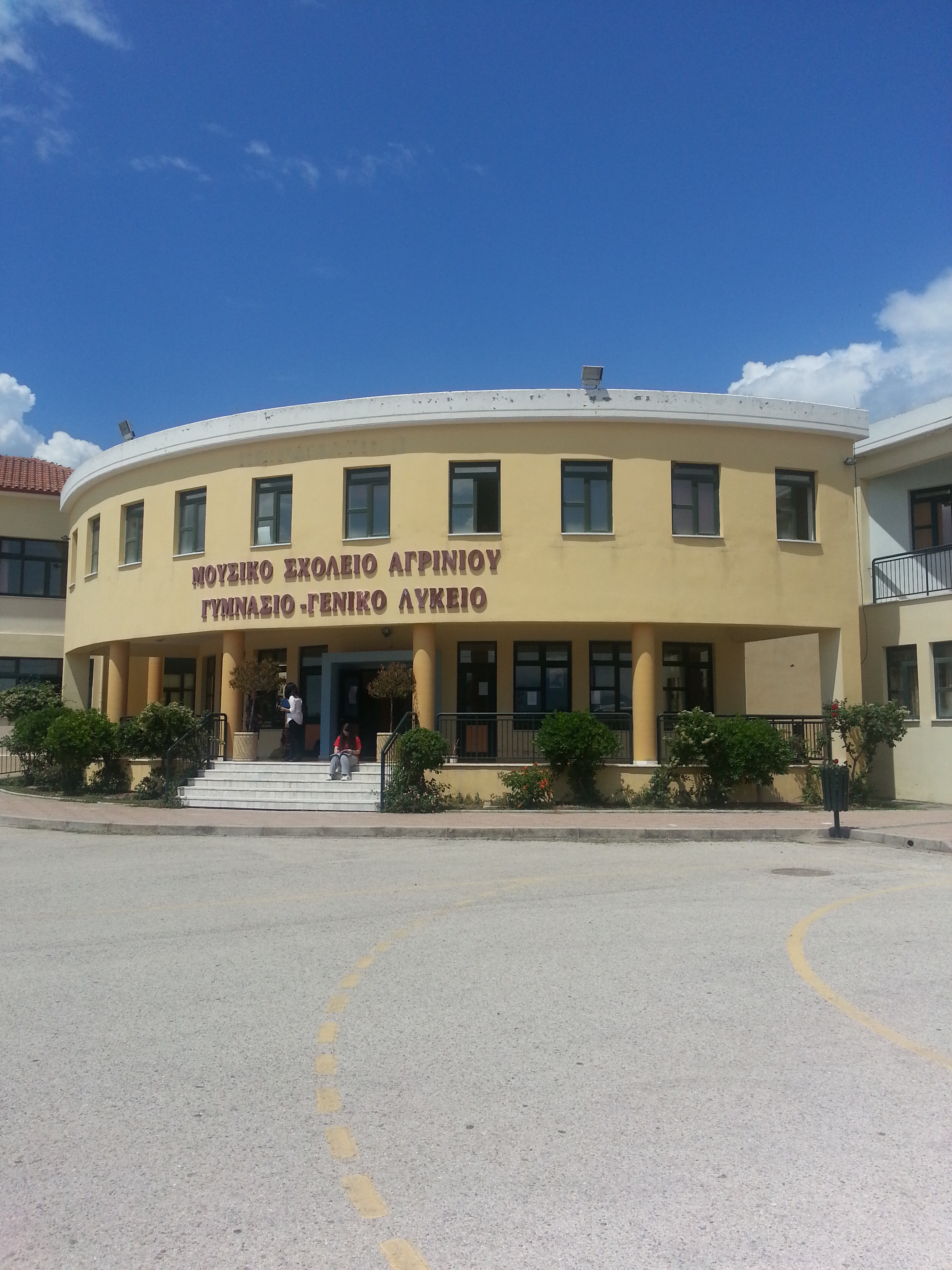
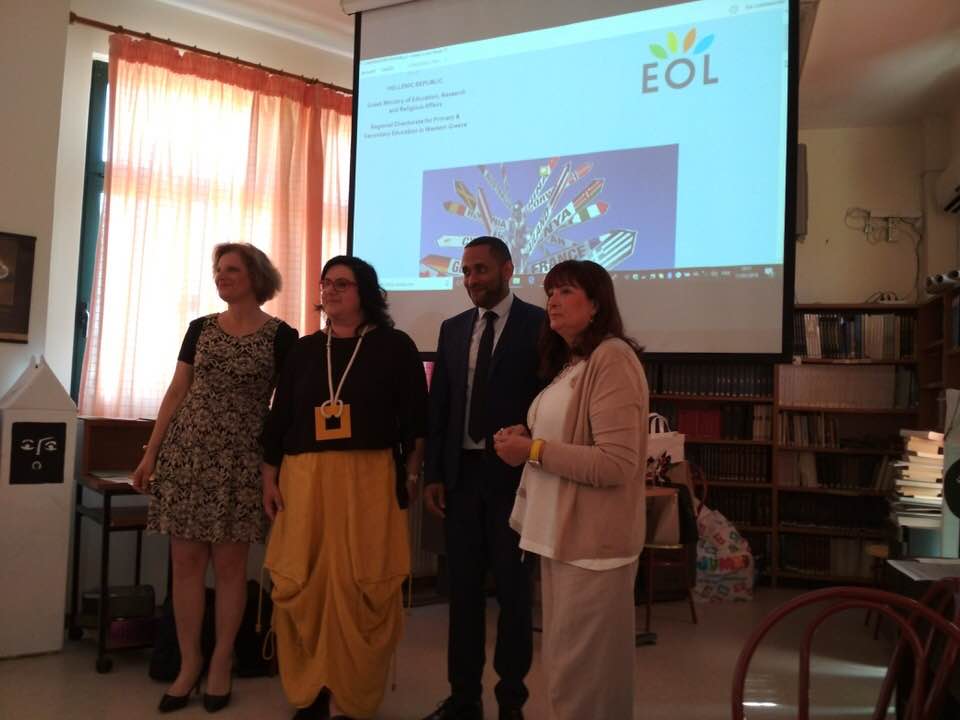
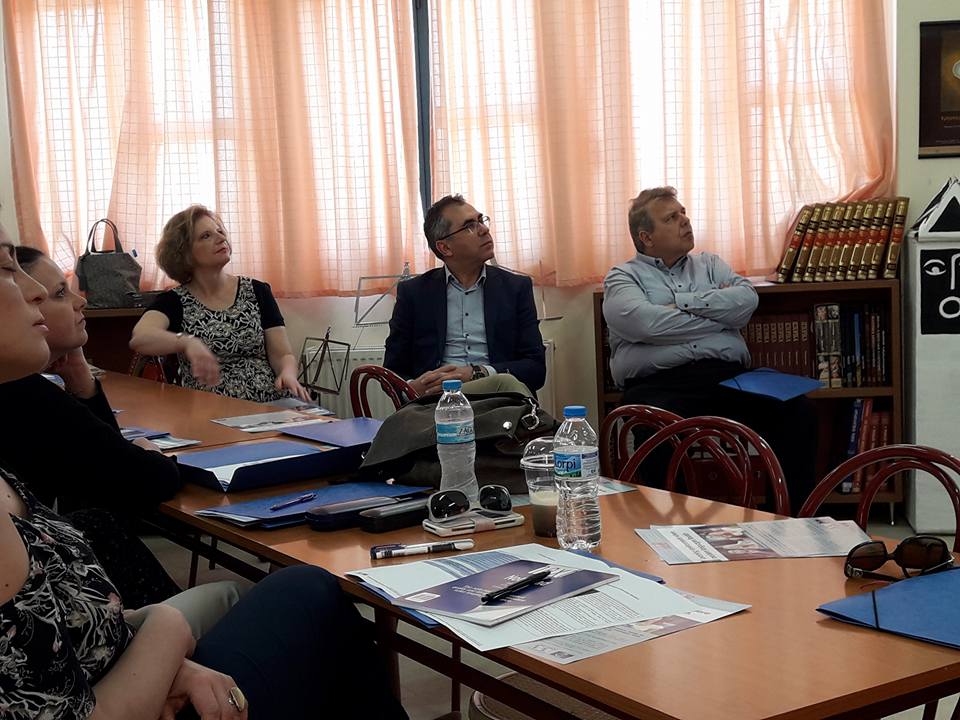
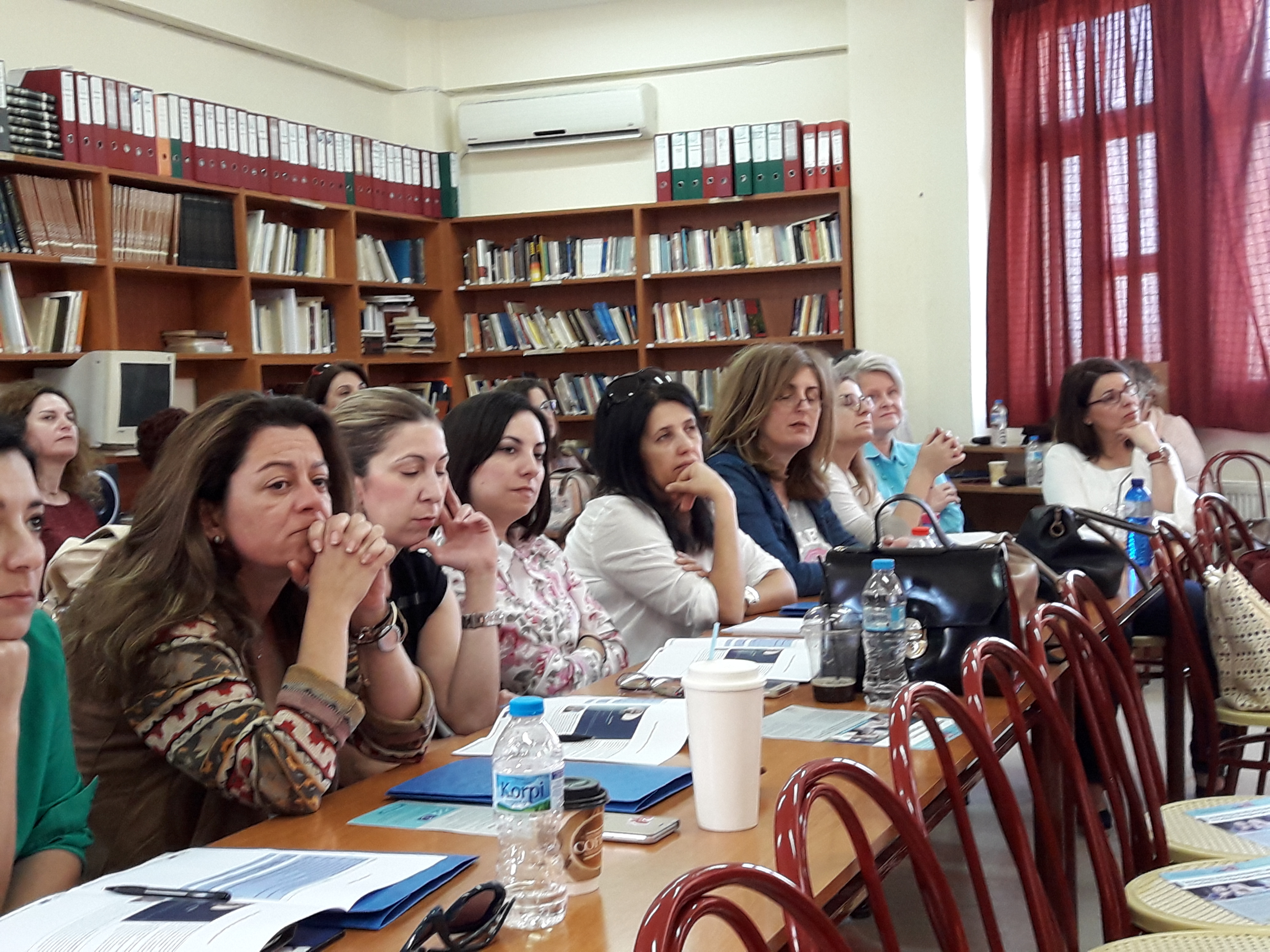
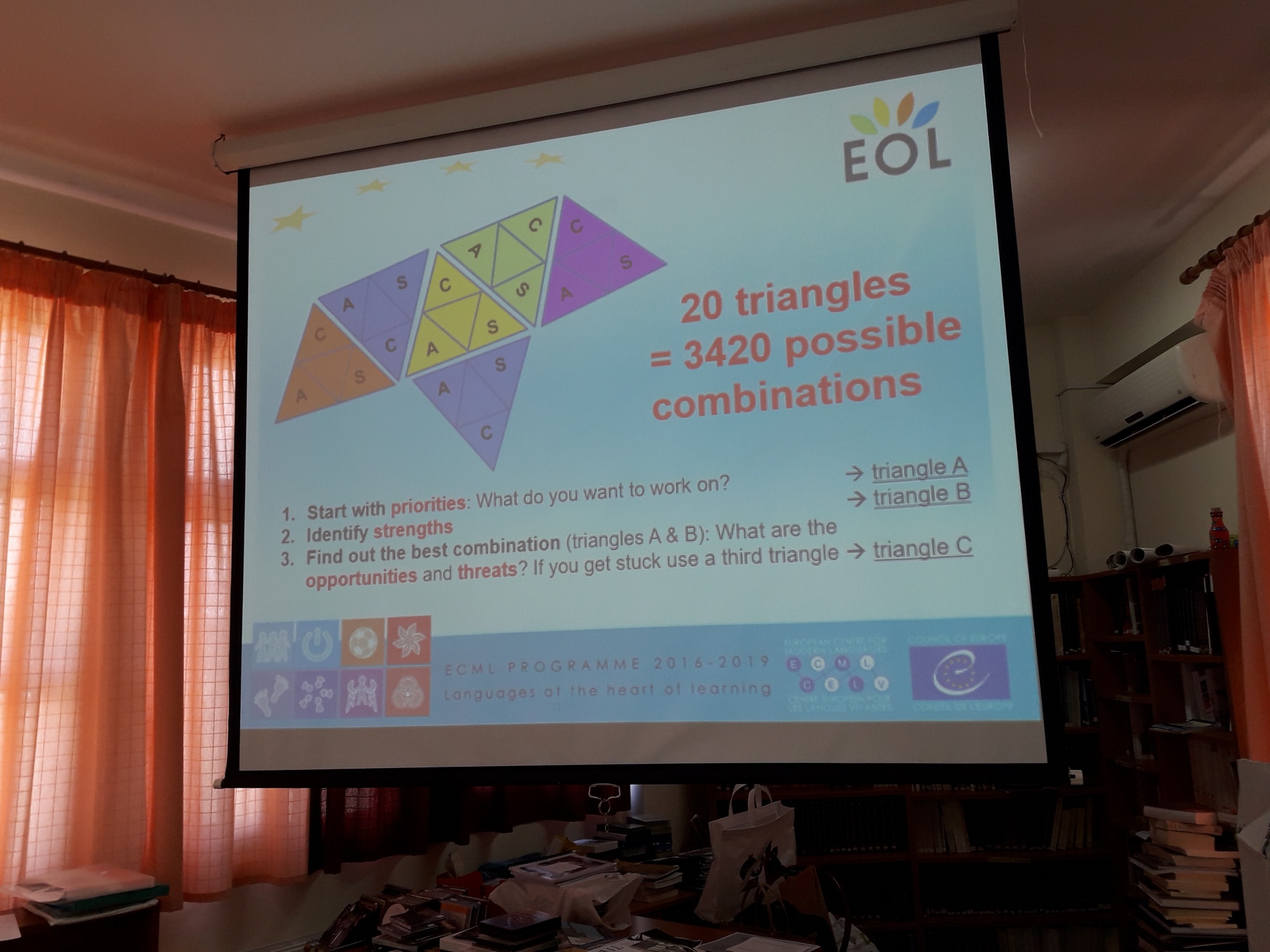
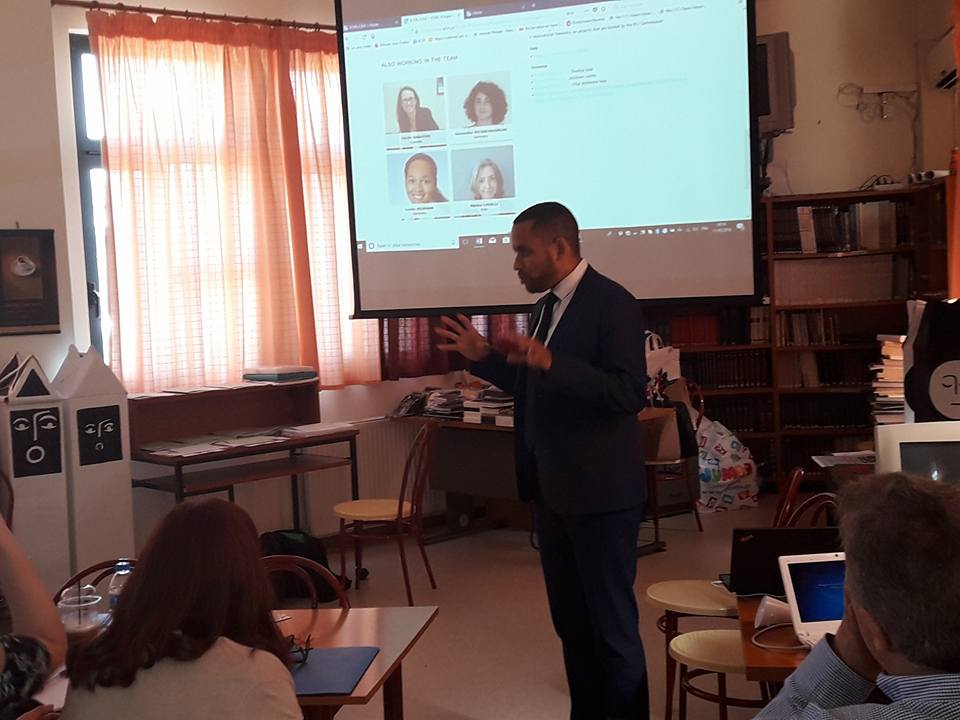
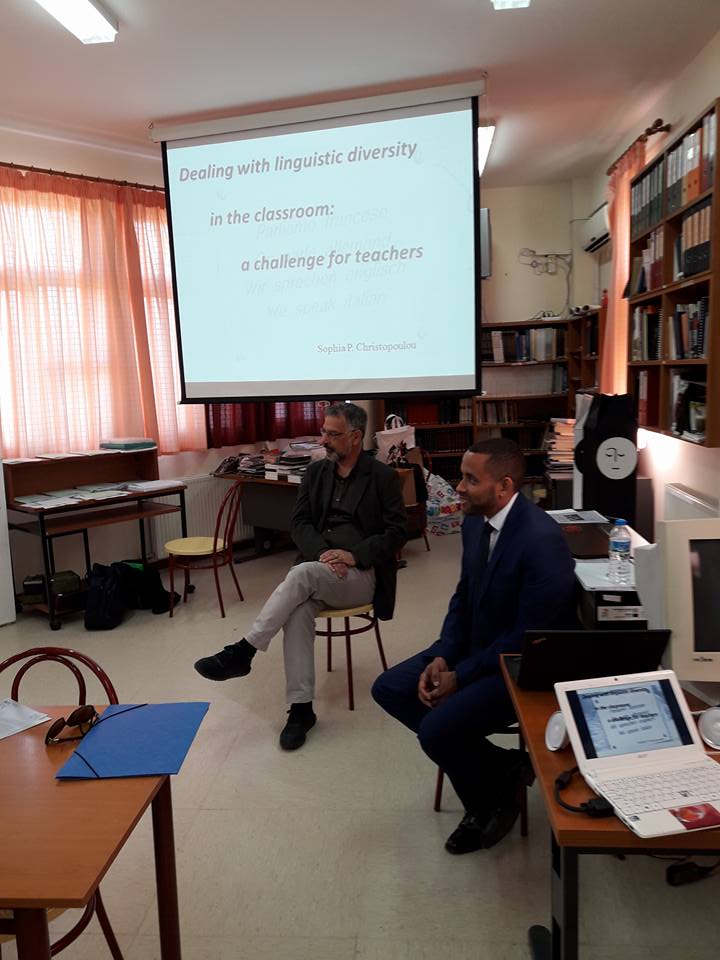
09.04.2018
"EOL - Learning environments where modern languages flourish": the network meeting (Graz, 20-21 March 2018), a key step for the ECML project
http://eol.ecml.at/
The EOL network meeting took place at the ECML in Graz on 20-21 March. The network meeting is a key step for each ECML project as it provides an opportunity to get direct feedback from different experts on tools, resources and developed approaches.
The team carefully selected the participants according to their expertise and geographical professional background. The network meeting brought together teachers from partner schools, school principals, institutional representatives and researchers. The team had also the pleasure to welcome Flore Schank, coordinator of the project Inspiring language learning and teaching in the early years, and Angela Gallagher-Bretts, team member of the project Action Research Communities.
The EOL project is in its third year of development. The concepts are consolidated, the working environment (European network, working platform, forum, etc.) is adapted to the needs. The tools have nearly all been set up, the work on resources has been launched and the research data collection is almost complete.
The drafting of the final publication, the development of the training platform, the labelling process and the dissemination activities (workshop, conference), as well as the training and consultancy offer still remain to be accomplished.
The overall structure of the network meeting was reflected in the seven steps of the EOL training path:
- Step 1: Becoming familiar with Council of Europe values, learning environments and language policies;
- Step 2: Focusing on priorities MATRIX + TrEOL game;
- Step 3: Defining strategies built on case studies per group (Matrix questions);
- Step 4: Browsing for resources;
- Step 5: Testing the masterplan;
- Step 6: Implementing EOL Online training pathways; and
- Step 7: Collaborating.
Most enjoyable was the newly designed TrEOL game; playfully being able to analyse and to discover what is needed in order to create an environment that is supporting language learning and teaching. The main components are structures, people and culture.
The network meeting gave participants the opportunity to share reflections and analyse the project through four key entries:
- modern languages as a key for human ecology (matrix);
- using the card game “TrEOL”, a symbiotic, win-win approach to considering how modern languages can help address key challenges in education;
- interconnections and their role to enhance all “synapsis” of school systems (memos, glossary, resources);
- stakeholders’ and schools’ professional development (indicators, transfer tool and training platform).
If participants support the philosophy of the EOL project and see its benefits in their own working context, there are two types of critical feedback:
- methodology: participants made proposals to make the personal and collective path on learning environments more progressive;
- strategy: participants gave several suggestions on how to improve communication on EOL and to make the different tools more easily accessible.
In the end, the main elements of the project’s dissemination are: making publications user friendly, choosing a progressive approach and selecting easy access resources. The research part and the links to other ECML projects have been deeply appreciated by participants and should find a place in the final publication. The participants’ feedback is very encouraging and gives the team a great inspiration to finalise tools and resources.
|
|
Matrix
|
TrEOL
|
Questionnaires
|
Glossary
|
Website
|
|
Relevance
|
Good
|
Excellent
|
Excellent
|
Excellent
|
Excellent
|
|
Clarity
|
Good
|
Good
|
Good
|
Excellent
|
To be improved
|
|
Innovation
|
Excellent
|
Excellent
|
Good
|
Excellent
|
To be improved
|
|
Effectiveness
|
Good
|
Excellent
|
Good
|
Excellent
|
Good
|
|
Design
|
Excellent
|
To be improved
|
Good
|
Excellent
|
To be improved
|
|
|
Memos
|
Masterplan
|
Indicators
|
Transfer
|
Platform
|
|
Relevance
|
Excellent
|
Good
|
Excellent
|
Excellent
|
Good
|
|
Clarity
|
Excellent
|
Good
|
Good
|
To be improved
|
To be improved
|
|
Innovation
|
Excellent
|
Good
|
Good
|
Good
|
Good
|
|
Effectiveness
|
Excellent
|
Good
|
Good
|
Good
|
Good
|
|
Design
|
Excellent
|
Good
|
Good
|
To be improved
|
To be improved
|
The project team:
Jonas Erin (coordinator), Kristin Brogan, Silvia Minardi, Lea Štiberc
Website of the project "Learning environments where modern languages flourish" (available in English, French and German): http://eol.ecml.at/
12.02.2018
Intense and fruitful exchange of ideas on future developments in language education
The 2-day meeting (6-7 February 2018) at the ECML in Graz, Austria, was an excellent opportunity for the ECML project experts to discuss ongoing project developments with their fellow project coordinators.
They explored synergies between the different projects and exchanged good practice in project methodology. They discussed ongoing work on the development of their products and how to best disseminate the wide range of final results which will be achieved by the end of 2018 and 2019. They reflected on critical success factors to promote the achievements across and at the end of their respective project life cycles, to implement, to mediate, to possibly further develop them and to maximise impact in the various national and individual contexts. Finally they shared initial ideas for both the contents and the structure of the next ECML programme (2020-2023). They also highlighted the added value, both professional and personal, of coordinating ECML projects, seeing this as an opportunity to bridge policy, research and practice and contribute to making a real difference to quality language education in Europe.
Impressions of the meeting (photo gallery on Facebook)
Current ECML programme of activities 2016-2019: "Languages at the heart of learning"
05.02.2018
ECML project “EOL – Learning environments where modern languages flourish”: matrix and tools soon available to be tested by partner schools
Expert meeting, Graz, Austria, 15-16 January 2018
The focus of the fifth EOL expert meeting was the action research linked to the project. The team discussed:
- the identification of success factors of language learning environments;
- and the quality indicators for language learning environments.
The matrix and the different tools linked to the matrix (matrix scale, matrix questions, etc.) will soon be finalised and published on the working platform in order to be tested by the partner schools. All resources from the partner schools published on the working platform will be indexed with reference to a matrix field. A search engine based on educational level, theme and desired outcome will help finding resources from the partner schools.
With the purpose of fostering collaboration within the school communities, the team developed a tool called SPOT (standing for Strengths, Priorities, Opportunities, Threats) which will be tested during the forthcoming network meeting in March. This tool helps stakeholders to interconnect people, structures and culture and design a common strategy on language learning environments where modern languages flourish. The tool illustrates in a very concrete way how and why a holistic approach can foster language education.
The next steps for the expert team are:
- illustrating the EOL holistic approach to modern languages with concrete examples;
- finalising the quality indicators and reflecting on labelling strategies;
- preparing the network meeting (March 2018).
The project team:
Jonas Erin (coordinator), Kristin Brogan, Silvia Minardi, Lea Štiberc
11.01.2018
Learning environments where modern languages flourish (EOL): December Newsletter 2017
This year the "Learning environments where modern languages flourish" team had two expert meetings in Graz in February and in September 2017. These meetings were dedicated to the overall development of the project’s content, the communication with partner schools and the finalising of different tools for the project’s working platform. More than 70 schools from 13 countries have already joined the network getting access to planning tools (action plan, synopsis, schedule), communication spaces (forum, webinar) and specific content (memos, matrix, resources from other schools, etc.).
EOL partner schools are also offered two opportunities: the first one was to participate in an online MOOC “Making professional videos with your smartphone” by the Gobelins school for image (November – December 2017) and the second one will be to test during spring 2018 the self-assessment tool developed by the project team of the ECML project “A roadmap for schools to support the language(s) of schooling”. The team also concentrated on any future communication with partner schools and the network event (19-21 March 2018).
During this year, two webinars took place in May and September and all partner schools were invited to join. The first webinar was focused on presenting the project. During the second webinar, the team presented the working platform and its different tools. Two partners where invited to present their work: Severine Poc (Berck, France) showed a video resource about “augmented reality” and Olivier Launay (Rouen, France) presented an analysis about the impact of EOL on education policy. The recorded version of the second webinar is available on the working platform.
The EOL project has already had an impressive impact on practices in France by including parents, building new partnerships, enlarging school networks, getting all levels to work together to value plurilingualism.
At the moment, partner schools are being asked either to submit the action plan for their school project or to further implement the projects they have launched. These will be uploaded on the working platform and are provide wonderful examples of sharing with others.
In addition to defining their own EOL project, our partner schools are also requested to share resources with the EOL network (team and other partner schools) and to widen their strategies to achieve a whole school language policy.
With another expert meeting scheduled in January 2018, the team has a further opportunity to prepare for the network event. Working together with the partner schools is vital, given that one of the core aims for the team is to find success factors in creating “a learning environment where modern languages flourish”, i.e. “EOL”. These success factors will enable the team to develop indicators. The reflections on the EOL models during our meeting emphasised the need for developing a simple tool to illustrate the impact of learning environments on learners, because the development of such environments is central to the project. Developing an EOL approach for the teaching of modern language is another important task.
Jonas Erin & Kristin Brogan
Project website
09.05.2017
EOL network 'Learning environments where modern languages flourish' - 99 partner schools registered
The EOL ECML project “Learning environments where modern languages flourish” has already succeeded in recruiting 99 partner schools and teachers in ten different countries; we will continue to accept new partner schools until the end of July 2017.
The partner schools are asked to register on the website of the project’s working platform:
This European network of project partner schools will not only support one another in developing innovative approaches to establishing language friendly learning environments through an exchange of relevant resources, research and practice, but will have dedicated support from the project team throughout the lifespan of their school projects.
Schools that haven’t yet chosen a project topic may draw inspiration from the synopsis provided of other partner schools’ project topics; a certain number of French schools, for example, are already starting to share their project ideas and are willing to network with other schools from all around Europe to go even further in the development and implementation of their projects.
The “action plan” is an important tool which will be completed by the teachers involved in the project: it will give a handy summary of the different phases of their projects. The schools involved will be able to monitor all the activities which they are expected to carry out. Moreover, all the resources developed by the partner schools will be made available to the entire network. And of course, our partner schools will play a key role in piloting the matrix that has been developed by the project team.
All project outputs such as the synopsis, the action plan, the glossary and the matrix are available on the dedicated project website. The third expert meeting at the ECML in Graz during February 2017 had a packed agenda as so many different tools for partner schools had to be discussed and finalised. This is a truly multilingual project with all documentation available in French, German and English. This, of course, brings its challenges but as a result of the motivating driving force of the coordinator, Jonas Erin from France and the dedicated team members, everything seems to be possible!
At the last expert meeting not only the four team members were present (Jonas Erin from France, Silvia Minardi from Italy, Kristin Brogan from Ireland and Lea Štiberc from Slovenia), but Cécile Sabatier from Canada was also present and actively involved and her input was very much appreciated by the team. Another important “guest” was Monika Klamminger from the Seebacher Gymnasium in Graz. It was a real pleasure to discuss ideas of collaboration with her, as she is representative of our stakeholders.
As always the project team very much appreciated all the support and feedback it received from ECML colleagues, from technical support to constructive evaluation of results. It is nice to know that we all share the belief that this project will make a difference in the learning and teaching of languages.
Presently the team is looking forward to the launch of an online discussion forum for all partner schools in June and is working on preparing an international Webinar on the 24th of May 2017 (10am - 11.30am CET) with the partner schools. This will be the perfect platform for a question and answer session and to get to know some partners as well as clarify expectations. Some schools will also be invited to join the project Network meeting in March 2018 at the ECML in Graz.
Links
22.11.2016
Learning environments where modern languages flourish - EOL annual report 2016
 The consideration of learning environments leads to the question of possible misalignment between school structures (learning spaces, equipment, systems) and school cultures (contents, methods, projects, etc.). In order to help schools develop a long-term inclusive, plurilingual and intercultural school policy, the EOL project team has been working on the best ways for schools to bring their structures and cultures together. For example, the project team created a matrix 1.0., which should help schools identify their strengths and their possibilities for development in the field of modern languages. This matrix also aims to highlight how languages can contribute to general, civic and European education.
The consideration of learning environments leads to the question of possible misalignment between school structures (learning spaces, equipment, systems) and school cultures (contents, methods, projects, etc.). In order to help schools develop a long-term inclusive, plurilingual and intercultural school policy, the EOL project team has been working on the best ways for schools to bring their structures and cultures together. For example, the project team created a matrix 1.0., which should help schools identify their strengths and their possibilities for development in the field of modern languages. This matrix also aims to highlight how languages can contribute to general, civic and European education.
In addition, the team created a range of resources which support cooperation with partner schools:
- Communication : website, flyer, logo
- Translations : all information is translated into the three working languages (German, French and English) and some resources are also available in Italian and Slovenian
- Cooperation: local and national networks have been set up; a wider European network is in progress
- Support: ongoing development of a glossary, mediation tools for previous projects (“tools for schools”) and resources to help schools with their own projects
The EOL project team is delighted to work with all stakeholders in education in order to develop learning environments where modern languages flourish. More than 40 schools are already involved in the EOL project. If you believe this could be of interest to you, please click on the following link:
http://eol.ecml.at/Jointhenetwork/tabid/4176/language/en-GB/Default.aspx
*****
Author: Jonas Erin, coordinator of the ECML project "Learning environments where modern languages flourish"
Website: www.ecml.at/Learningenvironments
GERMAN VERSION
Fremdsprachenfreundliche Lernumgebungen": EOL – Jahresbilanz 2016
Die Überlegung zu den Lernumgebungen stellt die Frage, ob die Schulstrukturen (Lernräume, Ausstattung, Schulformen, usw.) und den Schulkulturen (Inhalte, Methoden, Projekte, usw.) entsprechen. Um Schulen bei der nachhaltigen Entwicklung einer inklusiven, mehrsprachigen und interkulturellen Bildungspolitik zu begleiten, hat das EOL-Projektteam daraufhin gearbeitet, Konvergenzen zwischen Schulstruktur und -kultur zu optimieren. Aus dieser Arbeit wurde eine Matrix 1.0. erstellt, welche Schulen ermöglichen soll, ihre Stärken und ihr Entwicklungspotenzial im Bereich der Fremdsprachen besser hervorzuheben. Diese Matrix verfolgt auch das Ziel, den Beitrag der Sprachen zur allgemeinen, staatsbürgerlichen und europäischen Bildung der Schüler expliziter zu gestalten.
Neben dieser Grundsatzarbeit hat das Team Tools entwickelt, um eine Zusammenarbeit mit den Partnerschulen auf fruchtbarer Weise anzugehen:
- Kommunikation: Webseite, Flyer, Logo
- Übersetzung: alle Informationen sind in den drei Arbeitssprachen (Deutsch, Englisch, Französisch) verfügbar und einige Ressourcen sind auch auf Italienisch und Slowenisch erhältlich
- Kooperation: lokale und nationale Netzwerke sind eingerichtet worden; das erweiterte europäische Netzwerk steht in der Entwicklungsphase
- Begleitung: ein Glossar, Vermittlungstools von bereits absolvierten Projekten („Tools for Schools“) und Ressourcen zur Unterstützung der Schulprojekte sind in Vorbereitung.
Das EOL-Projektteam freut sich darüber mit allen Akteuren im Bildungsbereich zusammen zu arbeiten, um fremdsprachenfreundliche Lernumgebungen zu entwickeln. Mehr als 40 Schulen sind bereits im EOL-Projekt involviert. Wenn Sie auch Interesse haben, dann klicken Sie auf den folgenden Link.
Von Jonas Erin, Leiter des EFSZ-Projekts "Fremdsprachenfreundliche Lernumgebungen"
*****
Webseite: www.ecml.at/Learningenvironments
Projekt-Team und -Partner
29.04.2016
Learning environments where modern languages flourish
This new ECML project is focused on creating suitable learning environments that support the learning and teaching of languages. Learning goals, teaching practices and education are all important components in order to create this specific plurilingual and intercultural context. The various links between languages and culture are another aspect of this project. And the question of how far languages can make a beneficial contribution to education is also addressed.
On a practical level the project addresses how to motivate pupils and teachers, how to support awareness of linguistic and cultural diversity and how to enhance language learning.
The target group consists not only of teachers and teacher-trainers but also headmasters, inspectors and decision-makers. An online platform will provide a network of schools in Europe with teaching resources, innovative materials and piloting tools. This project is mainly for lower and upper secondary schools, but also for primary schools, vocational schools and adult education.
EOL Project had its first expert meeting at the ECML in Graz on the 23rd and 24th of February 2016. The team consists of the coordinator Jonas Erin from France, Silvia Minardi from Italy who will focus on translation work, Kristin Brogan from Ireland who will look after communication tasks and Lea Štiberc from Slovenia who will work on the project’s website. All four experts met for two days in order to discuss the project’s content in great detail and plan ahead for all future activities and deadlines; for example, the second expert meeting in September at the ECML in Graz. Another expert member, Cécile Sabatier, is located in Canada and will join an expert meeting in the future. There are also two consultants available to the expert team: Marisa Cavalli from Italy and Frank Heyworth from Switzerland. Samantha Wickremasinghe, a Master student from the Technical University Darmstadt in Germany, will ensure that there is a close link between research and practice.
The coordinator is currently visiting 10 “academies” (French regional educational authorities) in France involving secondary and primary schools who are all participating in this project. The schools are part of a piloting phase and their participation has been approved by the French Department of Education. Other partner schools in Europe will follow to join the project during the second year.
Year one of the project’s duration is concentrating on the French schools and networking; year two will include more partner schools and the creation of a databank of resources (online platform). Year three will focus on the work on indicators and the creation of a label. The putting together of the EOL model will be the goal of the final year.
At the end of the expert meeting the team was fortunate enough to meet a teacher, Eva Einzinger-Scholz, who is working as an English and French teacher at the local secondary school Bundesgymnasium Seebacher in Graz. This was a wonderful opportunity to have an applied approach as a direct dialogue with a representative from our target group was available to ask questions about the project’s concepts. The project team members and the teacher all enjoyed and appreciated the discourse. Eva will now prepare the school’s profile as a first step of becoming a partner school.
There are three stages of supporting partner schools in this project:
1. Create a language- and school profile as part of the preparation
For example, strengths of a school in the area of languages (language of schooling, languages that are taught, heritage languages; etc.); structure of teaching methods (CLIL, Team-Teaching, bilingual teaching; etc.) and mobility (travel, partnerships and exchanges); specific features of the school (location, facility; etc.) and specific focus points in other areas of the school (PE, art, MINT-subjects; etc.). A template will be created in order to collate this information.
2. Whole School Policy (duration of one school year)
Supporting the project in specific schools based on each school’s profile and strengths. The following concepts should be featured: plurilingualism, intercultural approach and inclusive transversal education. Appropriate resources and tools have to be developed for each partner school.
3. Prototype of a suitable learning environment for modern languages (duration of one school year)
Systematic data collection in relation to the whole school policy in order to develop a prototype of a suitable learning environment. Further appropriate resources and tools have to be developed for each partner school.
Apart from concentrating on the deployment of this project; the expert team will also examine categories (suitable themes) of other already existing ECML projects. This will be beneficial to the team when creating relevant resources.
If you are interested to read more, please have a look at the website. If you are a teacher at a secondary school or a school headmaster and you feel that you would like to become one of our partner schools, please contact us.